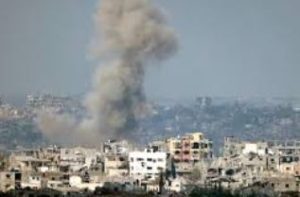A Greek village has resurfaced after a drought caused a lake to dry up.
Kallio village was sacrificed to build an Athens reservoir.

Coming up next, there may be some new homes popping up on Greece's version of Rightmove, but they might not be in the best condition. The country has been facing record-breaking temperatures and a severe drought, which has caused a sunken village to resurface in Athens' main reservoir.
According to EYDAP, Greece's water operator, the water levels have dropped by about 30% in recent months. This decrease is being described as "apocalyptic" by a Greek environmental group. The village of Kallio, which was intentionally flooded in the 1980s to create the reservoir, is now becoming visible again as the water recedes. Approximately 80 homes, a church, and a primary school were sacrificed for the greater good of providing a steady water supply to the capital.
As the effects of climate change continue to impact Greece, the extreme heatwaves have caused more and more of the village's buildings to reappear. These structures serve as a warning sign for the dwindling water supply in the area. Apostolis Gerodimos, the president of the Kallio community, explains that when the first houses are revealed, it signals a water shortage.
Gerodimos recalls a similar drought in 1993, which was resolved once the winter brought rain. However, this time, it has been 30 years since the last replenishment, and the situation has become dire. The 90-year-old former resident of Kallio, Konstantinos Gerodimos, expresses his concern for the current state of the village. He states that as the water level continues to drop, more buildings will resurface. If there is not enough rain in the winter, the problem will only worsen.
Dimitris Giannopoulos, the mayor of the broader Dorida municipality, shares the same worries. He points to Mount Giona, which used to be covered in snow but saw none last winter, the warmest on record for Greece. The lack of snow and rain has caused the lake's water level to decrease, and the surrounding trees have taken on a yellowish hue.
Greece's arid Mediterranean climate has made it particularly vulnerable to the effects of global warming. The country has already been hit hard by forest fires and extreme heatwaves this summer, including blazes that reached the outskirts of Athens. Scientists attribute the decline of the lake to extreme weather patterns caused by climate change.
Giannopoulos explains that wells in the area are drying up, and nearby villages that do not rely on the lake for water have also experienced water cuts this summer. The risk of wildfires also looms as the forests become drier, according to a local firefighter chief.
Former residents of Kallio were surprised to see their village resurface, but they were saddened by its current state. The lake's surface area has shrunk significantly, from 16.8 square km in August 2022 to just 12.0 square km this year, according to satellite images from Greece's National Observatory. The residents are now hoping for a wet winter to replenish the water supply.
In the meantime, the state-run Athens water company, EYDAP, has begun to provide additional sources of water to the network. However, the best solution remains a wet winter, and the residents pray that their houses will return to their rightful place.
1 Views










